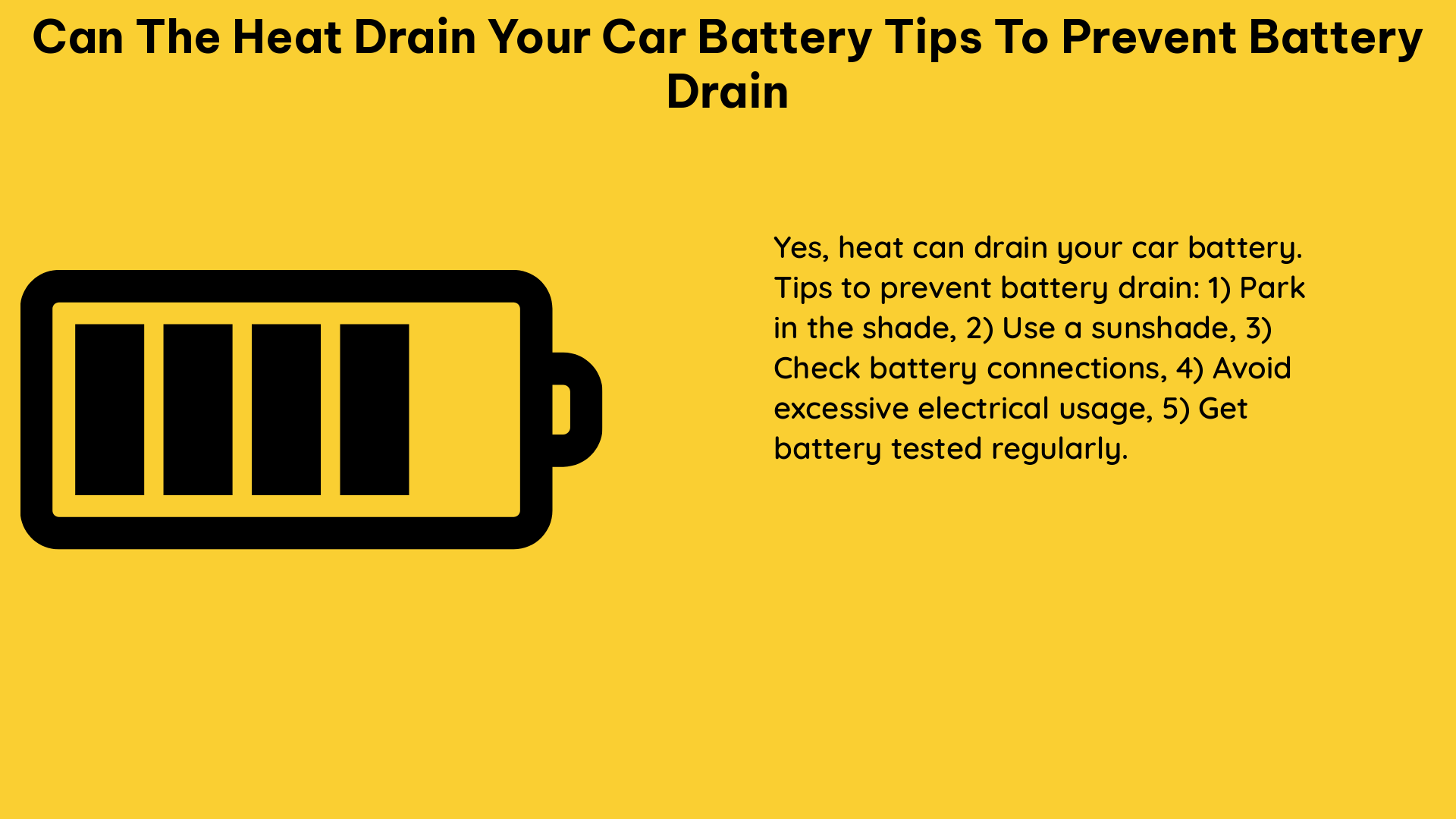The excessive heat can cause water in the battery to evaporate, leading to damage and a loss of power. Additionally, heat can promote battery swelling and corrosion on the posts, which deteriorate the internal structure, ultimately draining the car battery.
Understand the Impact of Heat on Car Batteries
Car batteries are designed to operate within a specific temperature range, typically between 32°F (0°C) and 95°F (35°C). When the temperature exceeds this range, especially on the higher end, it can have a significant impact on the battery’s performance and lifespan.
Evaporation of Battery Fluid
The lead-acid batteries used in most cars contain a mixture of sulfuric acid and water. Excessive heat can cause this fluid to evaporate, reducing the overall volume and concentration of the electrolyte solution. As the fluid level drops, the battery’s ability to generate and store electrical energy is diminished, leading to a weaker charge and eventual battery failure.
Increased Corrosion
Heat can also accelerate the corrosion process on the battery’s internal components, particularly the lead plates and terminals. This corrosion can create a barrier that impedes the flow of electrical current, reducing the battery’s efficiency and leading to a gradual loss of charge.
Swelling and Deformation
Extreme heat can cause the battery’s internal components to swell and deform, which can lead to cracks, leaks, and even a complete failure of the battery. This swelling can also put additional stress on the battery’s casing, potentially causing it to rupture or leak.
Reduced Cranking Power
As the battery’s performance deteriorates due to heat-related issues, its ability to provide the necessary cranking power to start the engine is also reduced. This can make it increasingly difficult to start the car, especially in hot weather conditions.
Tips to Prevent Battery Drain Due to Heat

To mitigate the impact of heat on your car’s battery, consider the following tips:
-
Park in the Shade or Garage: Whenever possible, park your car in a shaded area or a garage to protect the battery from direct sunlight and excessive heat buildup.
-
Use a Battery Blanket: Install a battery blanket or insulation wrap around the battery to help maintain a more consistent temperature and prevent heat buildup.
-
Regularly Check Battery Fluid Levels: Inspect the battery fluid levels periodically, especially during hot weather, and top up the distilled water as needed to maintain the proper electrolyte concentration.
-
Clean Battery Terminals: Regularly clean the battery terminals to remove any corrosion or buildup that can impede the flow of electrical current and contribute to battery drain.
-
Invest in a Battery Cooling System: Some vehicles come equipped with battery cooling systems that use fans or other mechanisms to actively regulate the battery’s temperature. Consider upgrading to such a system if your car doesn’t have one.
-
Limit Short Trips: Frequent short trips can prevent the battery from fully recharging, leading to a gradual loss of charge over time. Try to combine errands and drive for longer periods to allow the alternator to fully recharge the battery.
-
Reduce Electrical Load: Minimize the use of power-hungry accessories, such as air conditioning, heated seats, and infotainment systems, when the car is not running. This will help reduce the overall electrical load on the battery and prevent premature discharge.
-
Install a Battery Isolator: A battery isolator is a device that separates the main battery from the auxiliary batteries used for accessories, preventing the main battery from being drained by the auxiliary systems.
-
Consider a Battery Maintenance Charger: Investing in a high-quality battery maintenance charger can help keep your car’s battery in optimal condition, even during extended periods of inactivity or hot weather.
-
Replace the Battery Proactively: If your car’s battery is several years old and has been subjected to frequent heat exposure, consider replacing it preemptively to avoid unexpected breakdowns.
By following these tips and maintaining a proactive approach to battery care, you can help extend the lifespan of your car’s battery and prevent premature failure due to the detrimental effects of heat.
Conclusion
Excessive heat can indeed drain a car’s battery, leading to a host of problems, from reduced cranking power to complete battery failure. By understanding the impact of heat on battery performance and implementing the right preventive measures, you can safeguard your car’s battery and ensure reliable starting and operation, even in the hottest of weather conditions.
References:

The lambdageeks.com Core SME Team is a group of experienced subject matter experts from diverse scientific and technical fields including Physics, Chemistry, Technology,Electronics & Electrical Engineering, Automotive, Mechanical Engineering. Our team collaborates to create high-quality, well-researched articles on a wide range of science and technology topics for the lambdageeks.com website.
All Our Senior SME are having more than 7 Years of experience in the respective fields . They are either Working Industry Professionals or assocaited With different Universities. Refer Our Authors Page to get to know About our Core SMEs.